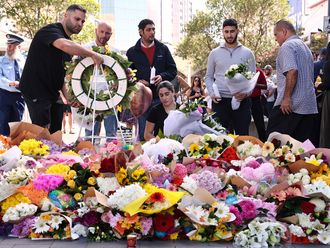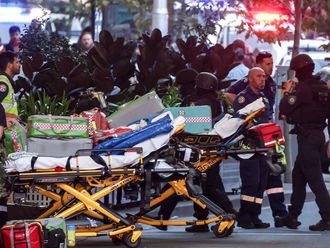Harare: Zimbabwean President Robert Mugabe will set up a commission to probe allegations of factionalism threatening to divide his Zanu-PF party ahead of an elective congress in December, the party spokesperson said on Friday.
“The President was candid enough and frank enough to tell us the factions he has been advised are existing, accordingly he will set up a commission to look at the allegations of these factions,” Rugare Gumbo, the Zanu-PF spokesperson said.
Gumbo said Zanu-PF’s supreme decision making body, the politburo had a “robust, frank and open” discussion on factionalism on Thursday with Mugabe naming alleged faction leaders as Vice President Joice Mujuru and Justice Minister Emmerson Mnangagwa.
Mujuru and powerful former spymaster Mnangagwa are seen as the leading contenders to replace Mugabe, who has been in power since independence from Britain in 1980.
Infighting has escalated following Grace Mugabe’s surprise nomination to lead Zanu-PF’s women’s league, amid speculation she could be aiming to take over from her husband when he steps down or dies.
Mugabe is expected to be confirmed as the party’s leader at the congress, but the fight for positions on the powerful politburo could be decisive for the campaign to succeed him.
Enfeebled by its electoral loss to Mugabe and a post-vote split, Zimbabwe’s opposition Movement for Democratic Change meets on Friday to elect new leaders and forge a new plan against Mugabe’s 34-year rule.
MDC spokesman Nelson Chamisa said the two-day party congress, expected to attract 7,000 delegates, was likely to retain Morgan Tsvangirai as leader and, MDC members hope, see the embattled party emerge stronger.
“We are reinvigorating the party. It’s going to be more vibrant and rejuvenated after the congress,” Chamisa said.
“We are rebooting and re-energising the party to confront the dictatorship that is Zanu-PF and address the problems affecting Zimbabwe. We are ending the congress by electing a team that will lead Zimbabweans to a new Zimbabwe.”
He said the internal feuding currently threatening to tear Mugabe’s Zanu-PF party apart was a boon for the opposition.
“As Zanu-PF is collapsing, the MDC is rising,” Chamisa said.
But analysts expect little from the MDC congress, saying the party has lost focus after its defeat to Zanu-PF in last year’s general elections.
Rushweat Mukundu, an analyst with the political think tank Zimbabwe Democracy Institute (ZDI), said the congress was “almost a non-event.”
“Instead of picking up the pieces they ended up in squabbles and personal fights which resulted in the party splitting for the second time,” Mukundu said.
Splits have been prompted by arguments over Tsvangirai’s continued leadership, despite a series of election defeats and personal scandals.
A party faction headed by Tsvangirai’s erstwhile deputy Tendai Biti moved to suspend him, and the veteran trade union leader promptly responded by expelling all involved in the bid to cast him aside.
“When you are busy fighting for positions instead of mobilising for support it means something is wrong. The MDC needed to come up with a clear message on how it intends to get Zimbabwe out of the current economic quagmire,” Mukundu said.
Independent political analyst Takura Zhangazha said chances of the MDC recovering from its split were distant.
“The MDC lost a chance even before the split in Zanu-PF began to show,” Zhangazha said.
“The chances of the party re-uniting itself are relatively slim but the congress could be an opportunity for them to show political maturity and come up with a message that makes them relevant to the general populace.”
The dire state of Zimbabwe’s economy may offer the MDC a chance at renewal.
Takavafira Zhou, a political scientist from Masvingo State University said the MDC should offer a policy in contrast to Zanu-PF.
“The MDC needs to show ideological clarity and come up with a definite way forward. People need jobs, food and decent shelter. What people need is a leadership that gives an alternative to Zanu-PF,” Zhou said.
Formed in 1999, the MDC with former trade unionist Tsvangirai as leader has presented the most formidable challenge to Mugabe’s stranglehold on power.
But it was weakened by Mugabe’s strongarm tactics and splits among party officials.
In 2006, Tsvangirai parted ways with his deputy Gibson Sibanda, secretary general Welshman Ncube and a host of other party officials over a decision to contest in senatorial elections.
Tsvangirai’s MDC recovered enough to win the majority of parliamentary seat in 2008, becoming the first opposition party to beat Zanu-PF since independence in 1980.
In the same election Tsvangirai won the first round of the presidential race but lost in the run-off that was marred by violence that claimed the lives of around 300 opposition supporters.
To end the poll violence and stem the economic downturn, Tsvangirai and Mugabe formed a power sharing government with Tsvangirai as prime minister.
The tenure of the power-sharing government brokered by the regional SADC bloc elapsed last year leading to new elections won by Mugabe.












